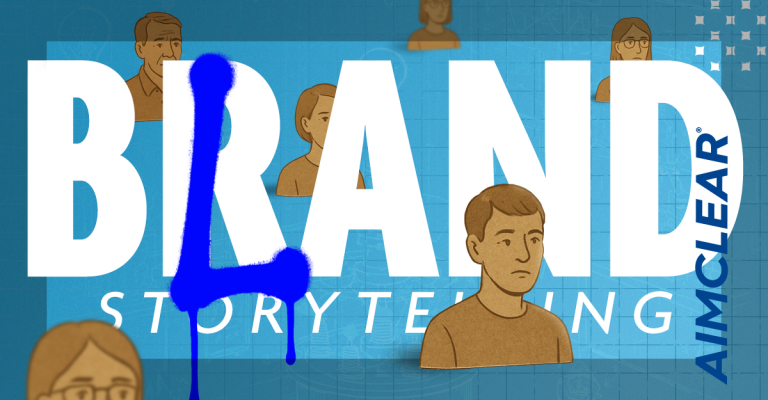In the agency world, account management is really the human engine that drives every project. Account managers are responsible for generating momentum for clients and delivering meaningful results strategically, innovatively, and efficiently. Key to their success are the abilities to partner across internal departments and inspire others to serve the common good. Skilled account managers are typically seasoned marketers and business professionals, steadfast and diplomatic with a deep passion for success. While they bring wisdom and experience to a team, many are selfless, humble individuals who focus on making others the hero.
While perusing the AIMCLEAR blog archives recently we came across a compelling post outlining the habits and instincts associated with phenomenal account management. Originally penned by Marty back in 2013, much has changed since then for AIMCLEAR in terms of organization and maturity. At the same time, the industry has seen dramatic changes over the last five years.
We thought it would be a valuable exercise to re-examine the defining characteristics of a great account manager. Read on for the sequel. While some characteristics remain foundational attributes, quality account management has evolved in some interesting ways.
Cater to the constituents above all else – Great account managers strive to make their clients the real hero. Empower them to shine in their own organization and the success will often reflect back on the agency. The first step is understanding their organization inside and out. Analyze the needs and back stories of a client’s supervisors and other key stakeholders. Align the cadence, depth, and desired template they expect from reports and updates; making it as easy as possible for the client to be a star in front of their superiors. Account managers who do this well almost invariably forge deeper trust and partnership.
Don’t miss the forest for the trees – The ability to maintain or alter perspective appropriately can be difficult, particularly when deep in the weeds. Questioning your own motives can be a great quality, but can also impede success if not done methodically. Don’t allow myopia to get in the way of the big picture. With a myriad of strategies changing in marketing and the agency universe – seemingly by the day – the big picture can be obscured more than ever. Seeing beyond one perspective is of paramount importance.
Adapt or risk irrelevance – Superb account managers maintain proven, repeatable processes. However, they are never married to one way of doing things. Whether it’s an industry, client, or internal shift, anticipate and welcome change, break out of a comfort zone, throw out personal opinion, and be prepared to pivot along the way. And never, EVER utter the words, “this is the way we’ve always done things.”
Take time to sharpen the saw – Going hand in hand with being able to adapt, exceptional account managers continually learn new skills, channels, or strategies – particularly if doing the same thing yields the same mediocre results. Listen to leadership podcasts. Stay current via industry publications. Develop new skills through continuing education. Great managers set aside time each day for learning so they can provide exponential returns as vendor and internal team member.
Get your hands dirty – Skilled account managers are unafraid to work outside of their job title or pay grade to get the job done. Most superhero AMs have worked their way up from a production support role and understand the inner workings of what makes an account or account management team tick. At the same time, they also know how to avoid micromanaging people in those other lanes. Be additive to the process – not overbearing. When working outside the job title, do so in ways that empower and instruct others to become great.
Accept that sometimes perception is reality – Your reputation is only as good as your word. Don’t make promises on behalf of teammates without first consulting. If you make a promise, you better be prepared to move mountains to keep it.
Exponentially grow value – At the highest level, account management can be distilled into two main responsibilities: Growth and retention. Creating short- and long-term strategic roadmaps for both will inherently foster greater value, as retention can’t exist without account growth, and vice versa. Uncover opportunities and ways to expand or pivot relations for mutually beneficial results. Great work almost invariably feeds more work.
Celebrate the wins, learn (quickly) from the losses – Showing appreciation for team members is a hallmark of effective account management. Rejoice in the successes and call out improvements. Adept account managers know every day won’t be a breeze, so when failures occur (and they will), they bypass the urge to jump to fault or conclusions. Instead, they assess the totality of a situation, establish a solution, then hold a post-mortem to communicate learnings and move-forward processes. Sometimes the most considerable advancements are born from the rubble of failure.
Be beyond reproach in your communication – Use neutral words concerning gender, race, orientation, etc. If you must ask whether your verbiage is offending or ‘PC’, chances are it isn’t. It’s 2018, people, stay woke.
Don’t swear – Almost everyone has dropped an involuntary or untimely expletive; we’re human. And while swearing can be a social norm depending on where one lives and works, an Inc. survey recently confirmed it mostly depends on context. I once sat on a call during which a third-party vendor kept tossing in profanities when speaking of a client’s work (“their s*** is great; I love their s***“). Though it wasn’t used in a disparaging or pejorative manner, I was thankful the client wasn’t present. The individual unwittingly lost credibility that day. Even if you think you have a gauge on a client’s personality and capacity for cursing, why run the risk of inadvertently offending? As a rule of thumb, it’s safest to keep the profanities off client lines.
Master the fundamentals – Account management is often responsible for innovation. Pioneering new marketing territory is a critical component to thought leadership and retention, and unless there is a comprehensive grasp of marketing and channel fundamentals, money will often be wasted when pursuing hype. We so often inherit accounts that employ every ad new ad type available, but totally miss the mark on basic, tried and true account strategies and tactics that produce predictable results. Proficiency in the fundamentals can often provide a strong base and opportunity for future innovation.
Stay two steps ahead – Complacency can be the kiss of death. Whether internal or client side, top account managers see proactivity as a central role. From client communication and deliverables to strategy development and optimization to keeping abreast of channel, market, and industry trends, competent managers position themselves as a respected and integral partner by anticipating the next move (or three).
Mitigate meeting mania – Meeting overload is real challenge for agency pros. Since our job is project and resource management and profitability, we have the responsibility to help others work more productively. Don’t suffocate talented peers. Empower them to work more efficiently by meeting less and set expectations by requiring an agenda for every meeting.
Leading means more than leadership – Leading also means staying out in front of matters (both client-facing and internally) to prepare expectations. Anticipate misunderstandings. Keep the scope of work handy. Set expectations and communicate with the client and team while making sure expectations are met with the account manager’s internal leadership/c-level team.
Lead with empathy – It’s easy to get buried working on multiple accounts and focus so much energy mastering the above responsibilities that we forget we are dealing with real people in most aspects of our work. Good account managers strive for perfection, but always remember that mistakes will happen, deadlines will be missed, and projects won’t always go as planned. Effective account managers are cognizant there is a person on the receiving end of their communication. They spend a little extra time analyzing tone and empathy (or lack thereof) while working to solve problems or answering what may seem to be a dumb question. A little time invested in empathy can go a long way to resolving issues quickly. A lack of empathy, on the other hand, can create entirely new (and needless) problems.
When it comes to new business leads, know when to hold ’em & when to fold ’em – True, Kenny Rogers was referencing poker in his 1978 hit “The Gambler,” but what is marketing if not one calculated, long-term strategy to stay in the game and outmaneuver competitors? A wise supervisor once shared the thought provoking allegory that the contract proposal and negotiation stage are akin to the courtship of a budding romance. Much like one may be interested to know how their new flame separated from their previous paramour, pay attention to how a potential client leaves their former agency/partnership and how they treat you during onboarding. Heed the warning signs. Taking on a potentially toxic client JUST for revenue sake can torpedo much more than having a lackluster quarter. If a prospective client speaks nothing but ill of past vendors, gives your team an incessant runaround, or is just flat out rude, the writing may be on the wall for the remainder of the engagement. Making the decision to walk away – or run – from an unfit match can be a tough business call and can also pay immense future dividends for internal morale and retention.
The list above is based, in large part, on our own experiences watching what has worked well and what hasn’t over the past decade. Our team continually refines our approaches to account management. We assess the changing landscape for our industry and our clients’ businesses.
Attributes noted above are merely a starting point for consideration. We’d love to hear from you: What experiences and learnings have shaped how you approach account management over the years? Let us know and we’ll revisit this topic again sometime to share more of our ongoing learnings.










